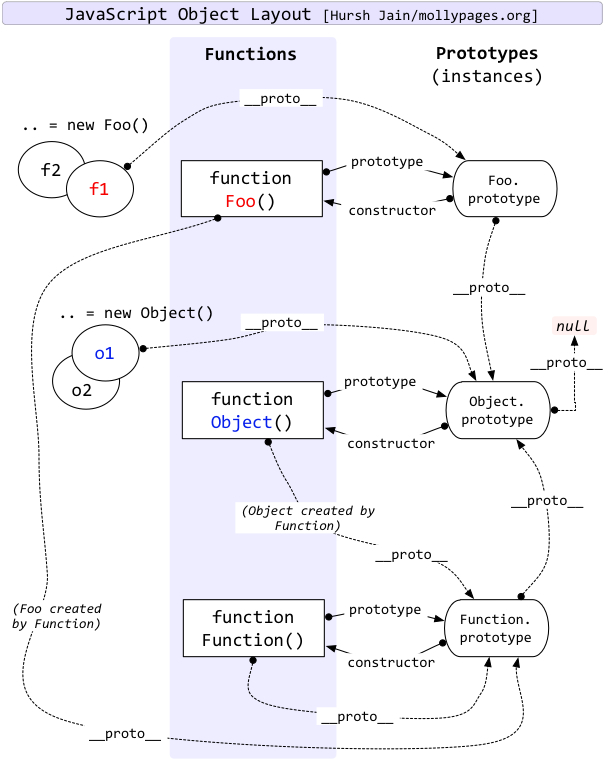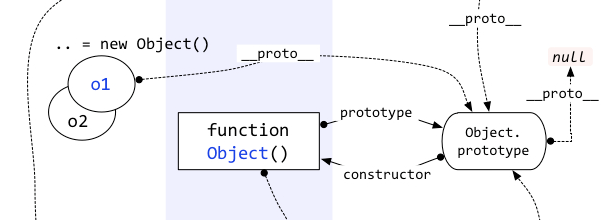【JavaScript】JS_Object跟Function的区别
JS_Object和Function的区别
我们本次的解释,主要通过下图

粗看该图,估计你不一定能看明白。不过接下来让我逐行向你解释。

- 最左侧:意思是,有两个对象f1和f2,他们是通过new Foo()出来的。
- 中间:Foo()就是最左侧用到的Foo()
- 最右侧:表示,函数Foo()的prototype属性!
function Foo() {
}
var f1 = new Foo();
alert(f1.__proto__ == Foo.prototype);
?function Object(){[native code]}//Javascript自带,不是自定义的,可以近似认为是基类
function Function(){[native code]}//Javascript自带,不是自定义的,可以近似认为是基类
?
这里的这两个function,分别走两个方向,
Object作为了众多object(实例,new出来的)的基类型
Function作为众多function(主要是那些function出来的,就是定义出来的函数)的基类型
?
在开始下面更细致的解释先,我们约定一些内容,Object代表这里所说的Object,object代表实例对象
,Function代表这里说的Function,function是关键字。对于Object与object的区别很好理解,一个是function,一个是new出来。
?
现在让我们思考两个问题:
第一个,当我们扩展Object原型时,new出来的Function,是否会被扩展?
第二个,当我们扩展Function原型时,由于Object也是个Function,那么其实例object是否会被扩展
?
先看第一个问题.eg.
?
Object.prototype.test4extend="123";//扩展Object的原型
document.write("Function:"+Function.test4extend);//在Function中出现了test4extend属性
document.write("<br>")
document.write("Object:"+Object.test4extend);//在Object中出现了test4extend属性,此时Object还是个Function
document.write("<br>")
var obj=new Object;
document.write("Object instance:"+obj.test4extend);//在obj中扩展了test4extend,此时的obj是object
document.write("<br>")
function Foo()
{
}
var foo = new Foo;
document.write("foo object:"+foo.test4extend);//foo对象上扩展上了test4extend属性
document.write("<br>")
document.write("Foo Function:"+Foo.test4extend);//函数上也扩展上了test4extend属性
document.write("<br>")
console.log("Object", Object);
console.log("Function", Function);
?注释已经写得很清晰了,通过以上几点我们很容易发现以下几点:
?
1、Object扩展了所有的object(obj,foo),与object扩展自Object是相符的。在这里更加验证了。2、Object扩展了Function,这点说明Function扩展自Object,说明Object比Function更底层些。
3、Object扩展了自身的属性,即Object.test4extend也是可以的。
这点说明,Object扩展了Function,又因为Object本身又是通过function定义出来的,所以会受到Function影响,所以,反过来Function又扩展了Object。
接下来看看第二个问题
Function.prototype.test4extend="123";//扩展Function的原型
document.write("Function:"+Function.test4extend);//在Function中出现了test4extend属性
document.write("<br>")
document.write("Object:"+Object.test4extend);//在Object中出现了test4extend属性,注意此时Object是个Function
document.write("<br>") var obj=new Object; document.write("Object
instance:"+obj.test4extend);//在obj中没有扩展上test4extend,此时的obj是object
document.write("<br>") function Foo() { }
var foo = new Foo; document.write("foo
object:"+foo.test4extend);//foo对象上没有扩展上test4extend document.write("<br>")
document.write("Foo Function:"+Foo.test4extend);//Function扩展上了test4extend属性
document.write("<br>")
??
?这说明Function只管没有被实例化得,被实例化的,他是没有办法管的。与Object不同,Object是无论是否实例化都管的。
接下来解释这个图:
先看最左侧的__proto__虚线,表示Foo.__proto__相当于Function.prototype,这里和Object情况差不多,只是属性一致而已,并不是指真正的那个Function
中间的下部的__proto__虚线,代表Function.__proto__等于Function.prototype,这里可是真的就是,和前面的相当于不同。
alert(Function.__proto__===Function.prototype);//true
?右侧左上的__proto__虚线,代表Object.__proto__等于Function.prototype,这里可是真的就是,和前面的相当于不同。
alert(Object.__proto__===Function.prototype);//true
?
?右侧右上的__proto__虚线,代表Function.prototype.__proto__相当于Object.prototype,只是属性一致而已,并不是真的。
先让我们总结下__proto__和prototype的区别和关系。
区别:从实际效果上来说,可以认为__proto__是用来扩展Function的,扩展出来的函数,可以直接调用,不需要new出对象才能用,同时对象是不会扩展通过__proto__扩展的方法或属性的
function Foo() {
}
Foo.__proto__.test = "__proto__ test property found";// 通过__proto__扩展
Foo.__proto__.addextend = function() {
document.write("Foo add extend by __proto__");
document.write("<br>");
}
Foo.addextend();// 可以执行
var foo = new Foo;
document.write("Foo:" + Foo.test);// 可以访问
document.write("<br>");
document.write(foo.addextend);// 未定义
document.write("<br>");
document.write("Foo instance:" + foo.test);// 未定义
document.write("<br>");
?
?
?对于prototype来说,它是针对对象的,也就是Function是无法使用的,只有new出来的才能有效
?
function Foo()
{
}
Foo.prototype.test="prototype test property found";
Foo.prototype.addextend=function(){
document.write("Foo add extend by prototype");
document.write("<br>");}
document.write(Foo.addextend());//未定义
document.write("<br>")
var foo=new Foo;
document.write("Foo:"+Foo.test);//无法访问
document.write("<br>")
foo.addextend();//可以执行
document.write("foo instance:"+foo.test);//找到了
document.write("<br>"
?
?
- ?在Object中__proto__是Function的prototype是Object。
- 在Function中__proto__是Function的prototype也是Object。
- 现在让我们再来结合第三行的图看一看。有如下关系。
Function.__proto__就是(===)Function.prototype
Object.__proto__就是(===)Function.prototype - Function的__proto__和prototype就是一个,扩展任何一个都是相同的效果。Object的__proto__就是Function.prototype。当我们扩展Object.__proto__时,就相当于扩展了Function.prototype和__proto__,反之亦然。
Object.__proto__.test4extend="123";//扩展Object的原型
?
alert("Function:"+Function.test4extend);//在Function中出现了test4extend属性
?
alert("Object:"+Object.test4extend);//在Object中出现了test4extend属性,此时Object还是个Function
?
var obj=new Object;
alert("Object instance:"+obj.test4extend);//未定义
?
function Foo()
{
?
}
?
var foo = new Foo;
alert("foo object:"+foo.test4extend);//未定义
?
alert("Function:"+Foo.test4extend);//函数上也扩展上了test4extend属性
??【总结】
Function扩展自Object,但是Function对Object又有影响,这是通过Object.__proto__就是(===)Function.prototype建立的联系。记住这个联系后,我们还要记住__proto__和prototype的区别,前者扩展的只可以被Function直接调用,后者扩展的只可以通过其实例调用。另外,还要注意__proto__和prototype的链的概念,这是因为,他们可以互相关联,访问到Function或Ojbect的内容。



【推荐】国内首个AI IDE,深度理解中文开发场景,立即下载体验Trae
【推荐】编程新体验,更懂你的AI,立即体验豆包MarsCode编程助手
【推荐】抖音旗下AI助手豆包,你的智能百科全书,全免费不限次数
【推荐】轻量又高性能的 SSH 工具 IShell:AI 加持,快人一步
· 如何编写易于单元测试的代码
· 10年+ .NET Coder 心语,封装的思维:从隐藏、稳定开始理解其本质意义
· .NET Core 中如何实现缓存的预热?
· 从 HTTP 原因短语缺失研究 HTTP/2 和 HTTP/3 的设计差异
· AI与.NET技术实操系列:向量存储与相似性搜索在 .NET 中的实现
· 周边上新:园子的第一款马克杯温暖上架
· Open-Sora 2.0 重磅开源!
· .NET周刊【3月第1期 2025-03-02】
· 分享 3 个 .NET 开源的文件压缩处理库,助力快速实现文件压缩解压功能!
· [AI/GPT/综述] AI Agent的设计模式综述